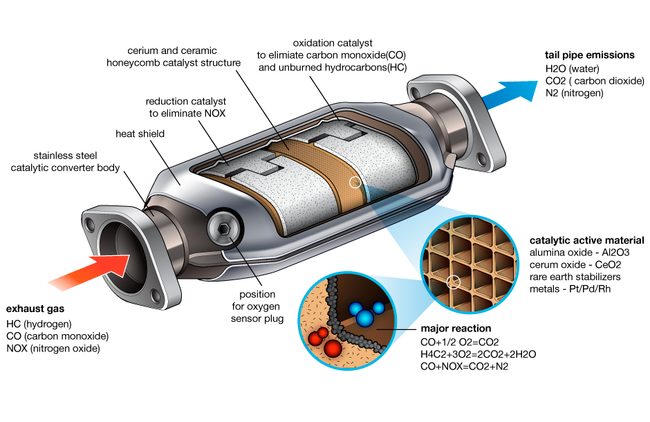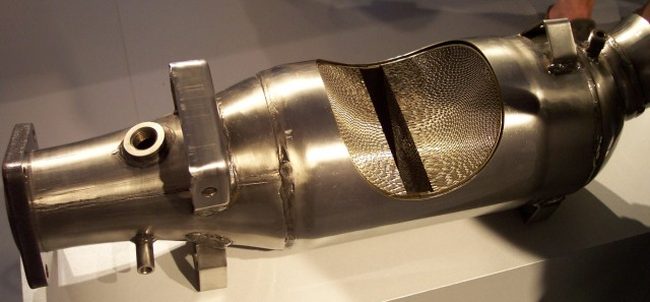Is the Catalytic Converter Important? How Catalytic Converters Work
If you’re interested in vehicles as well as keeping our Earth safe, you may be interested in learning more about catalytic converters and how these important devices help to combat against pollution. These devices are a great way to help keep the air around us clean. While this is a hot topic, many people have questions about the use of catalytic converters. Take a look at the following information to learn more about catalytic converters.
What is a catalytic converter?
A catalytic converter is a device that helps to turn toxic byproducts found in an engine into less toxic substances through the use of chemical reactions.

As a car runs, the catalytic converter turns pollutants into less harmful substances before they leave a vehicle through the exhaust pipe. This can help to clean up the air significantly!
Are catalytic converters only found in standard automobiles?
No! While they are found in standard automobiles, they are also in many other machines. This includes buses, trucks, motorcycles, and forklifts, just to name a few. Think of all the vehicles that exist and how much pollution they cause. To combat the pollution, many machines utilize catalytic converters.
Catalytic converter fail?
Yes! There can be a variety of issues with a catalytic converter. For example, a converter can become clogged. A bad exhaust valve on the engine can also cause the converter to work incorrectly. When it fails, the converter won’t be working correctly to combat toxins. If you feel your catalytic converter has failed, it’s important to take your vehicle to a mechanic in order to get it checked out. This is a part that needs to be replaced, if broken.
What would happen if these devices didn’t exist?
Even more harmful pollution would enter our air, making the air clean and unhealthy for us to breathe. Catalytic converters are just one way to keep the air cleaner. Many other products and devices will continue to be researched and developed in the future in order to make even more changes for the Earth.
Under federal law, catalytic converters may not be removed and replaced with "converter replacement pipes" by any person!
Catalytic converters are devices that are found in a vehicle’s engine and help to turn toxic substances into less harmful pollutants. This can help to keep the air cleaner so that we are breathing in safe air when going about our everyday lives. In order for these devices to work correctly and safety, there are important catalytic converters laws. Take a look at the following information to learn more about the use of these devices.
Catalytic converter guidelines have been in place since 1987. These laws were officially outlined by the U.S. Environmental Protection Agency. These laws put in place outline how the converters must be designed, tested and manufactured.
If a company is selling aftermarket catalytic converters, they must keep careful records of the devices that they sell. This help to ensure that all converters are being made and sold legally. The U.S. Environmental Protection Agency requires certain specifications to be made in order to keep converters working correctly so that our air is cleaner.
What are some of the requirements? When selling new converters, they must come with a warranty. This helps to ensure that if problems arise, a vehicle owner will be able to get their converter working correctly. Used catalytic converters are able to be sold, but they can only be sold if they are made for the same type of vehicle that they’re being installed in.
There are also guidelines in place as to when an aftermarket converter can be installed in a vehicle. The vehicle must have been missing the device, local or state inspector must verify that the converter is poisoned, damaged, or not working, or if the vehicle is more than 5 years old or has more than 50,000 miles (8 years/80,000 miles for 1995 and newer vehicles) and the catalytic converter has a documented need of replacement.

These are just some of the laws that are put in place to protect vehicle owners as well as our environment. More information on these regulations can be obtained through the U.S. Environmental Protection Agency. As you can see, catalytic converters must be made correctly in order to work in a way that will help to keep our air cleaner.
If you’re interested in learning more about the use of catalytic converters and the benefits of using these devices, be sure to continue to read the Catalytic Converters Reviews blog. You will see more helpful and informative blog posts in the future.
When Did Catalytic Converters Become Mandatory?
Like with many things related to vehicles, there are specific parts regulations in place in order to keep a vehicle running correctly and safely for an extended amount of time. Catalytic converters are an important part of a vehicle. This device helps to control and lessen the pollution that comes out of a vehicle. This can help to keep our Earth cleaner. Many individuals wonder when did catalytic converters become mandatory, and if you’re also interested in this, read on to learn more!
So, when did catalytic converters become mandatory? In 1987, the U.S. Environmental Protection Agency outlined guidelines to shape laws regarding the use of catalytic converters. By January 1, 1988 it was illegal to install or produce catalytic converters without following all of the laws. These regulations were put into place in order to ensure that each vehicle is equipped with appropriate machinery in order to help to keep the air clean and combat some automobile pollution. To this day, strict regulations must be followed.
Without these regulations in place, companies could sell faulty catalytic converters or could sell vehicles without having installed these important devices. Additionally, drivers may not be able to get a proper catalytic converter in the event of a previous one failing. This is why it’s important to have regulations in place and to make sure that they’re being followed. The U.S. Environmental Protection Agency helps to protect against fraud.
What are some of the regulations that are in place? Both used and new catalytic converters are able to be sold. New ones, however, must include a very specific warranty to ensure that repairs and replacements are able to be made if needed. Used converters can only be placed in the same types of vehicles that they were originally made for. Additionally, there are laws against the use of aftermarket converters. The many laws that relate to catalytic converters are detailed and should be carefully understood. These are just some of the regulations that are in place.
If you’re wondering when did catalytic converts become mandatory or other questions related to the use of catalytic converters, be sure to continue to read the Catalytic Converters Reviews blog for more informative posts. You will find many great related links and resources.

